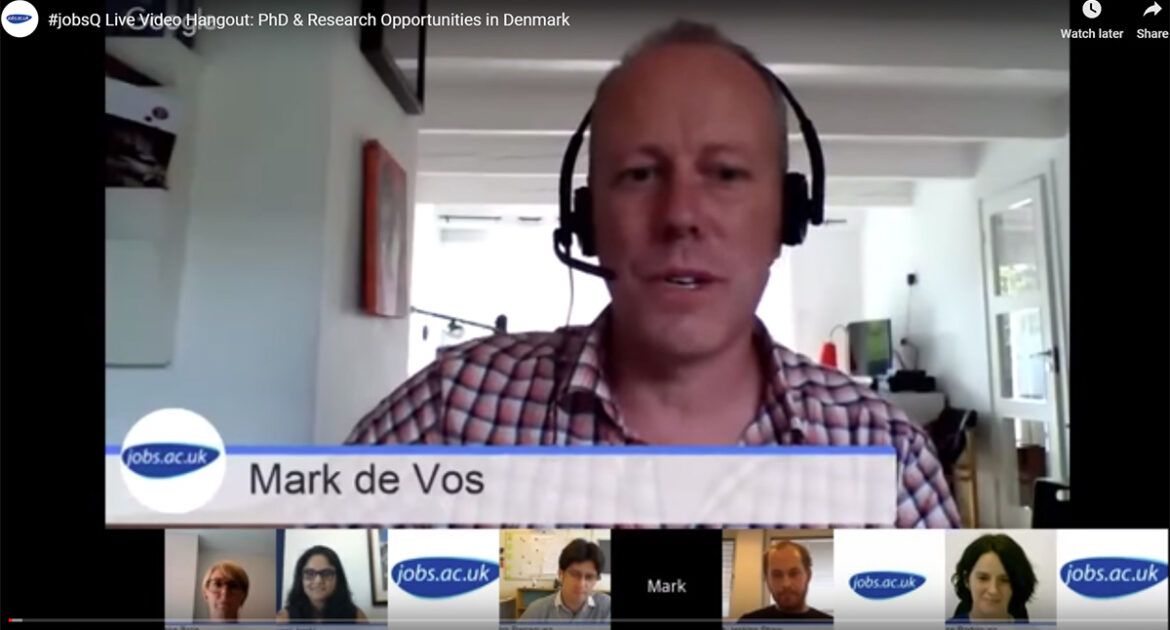We hosted a live Google+ Hangout on Air with six inspirational panellists with one simple objective: to help you consider opportunities open to you and specifically options for pursuing PhD & Research Opportunities in Denmark.
The panel included Mark de Vos, Senior International Mobility Consultant at the University of Copenhagen (UCPH), who uses his international work experience in Ghana, India and China to assist International researchers coming to Denmark. Vibeke Broe has worked as a Careers Consultant at Aarhus University since 2012 and focuses on careers options for PhD students outside of academia. Pedro Parraguez is a Postdoctoral Researcher in the Engineering Systems Group at DTU. Shivani Joshi is from Mumbai, India and moved to Denmark in 2010 to pursue her PhD and now works as a postdoctoral scientist at the department of Clinical Medicine, Aarhus University. Josh Jenkins Shaw moved to Denmark after completing his Masters in the UK to start research on beetle taxonomy and evolution. Ileana Rodriguez Leon is Senior Research Scientist at global healthcare company Novo Nordisk A/S.
Do you need to speak Danish?
No. Our panellists agreed that speaking Danish is more of a useful option rather than a necessity. Even after years of living in Denmark, Pedro, Ileana and Josh all confessed that their Dutch was still almost non-existent! Careers in science, in particular, rely on being able to speak English so knowing Dutch is not always needed. Mark pointed out that learning the language is free, regardless of whether you are working for a university or private company. So, if you have the time, learning Dutch could help bring you closer to the people and culture.
What are the funding opportunities?
A key message in the panel’s discussion regarding funding was that PhD positions are seen as legit jobs in Denmark and treated as such. As a result, you can enjoy a salary and benefits in the same way as any other employee. Pedro explained that funding often falls into two categories: firstly, a department will be actively recruiting and have a budget in place for research. Alternatively, a company will sometimes create positions that are part-funded in association with a university in order to fulfil a need for research. Shivani suggested projects that often have funding attached to them, including Marie Curie projects, Horizon 2020 grants and projects at the Danish Council for Independent Research. An emerging theme was networking: Vibeke offered that networking is important, particularly during your PhD, because it will open up opportunities for you when applying for postdoc positions.
What is the structure of PhDs in Denmark?
Our panel talked at some length about how research has more emphasis on continually publishing papers and collating these compared to the UK’s focus on writing a thesis of four or five chapters. Shivani talked about the flat hierarchy that she has experienced in Denmark. She also complimented the independence and trust she has been given in her work that allows her to enjoy a good work/life balance. Josh said that he was comfortable talking to his professors and supervisors as colleagues or even friends and that there was no barrier. The relationship is different in Denmark as researchers are not treated as ‘students’. Perhaps one of the best benefits of carrying out research in Denmark is receiving a working contract, with salary and pension.
What is the working culture like?
Ileana answered this question by describing her seven and a half hour working day. Before having her daughter, she was working much longer days but found that family commitments pushed her to fit the same tasks into a shorter working day. Mark reflected that at the beginning of his career he would feel the need to impress his supervisors by staying late. Yet, the Denmark culture emphasises the need for hobbies and having a work/life balance. Shivani reiterated her comments about being left to work independently and that finding your own way of working was important. On the other hand, Vibeke had never encountered a PhD researcher who worked a seven and a half hour day, but did feel there is a lot of flexibility in working patterns. There is no issue with leaving early because there is trust that you will make up the time later. The recurring theme of this discussion was the good work/life balance that is so important in Denmark. According to Vibeke, developing interests outside of academia can be beneficial whilst adding credit for potential employers. As a large proportion of PhD students go on to a career outside of academia, this could be a deciding factor in how a career progresses after graduating.
Last words?
Shivani said ‘Speak up!’ as the Danish are a polite nation who will respect your privacy so if you need anything, you must voice your request. Pedro stressed not to spam departments with questions but rather, whittle your search down to a modest group of contacts who will be able to deal with your request most effectively, then get in touch directly. In a country that is renowned for its high taxes, it is very possible to live a comfortable life. Everything aside, being yourself will lead you to a satisfying career in Denmark.
Useful Links
Watch the video for further information and top tips from our expert panel!
To find out more about living, studying and working in Denmark, visit our Country Profile.
Explore PhD opportunities in Denmark here.





Leave a Reply